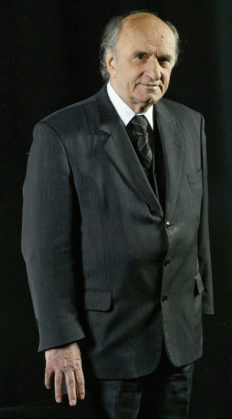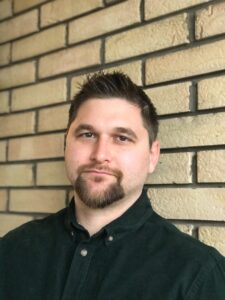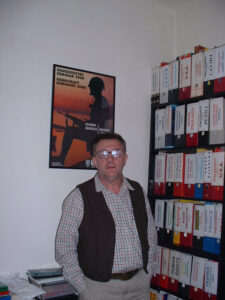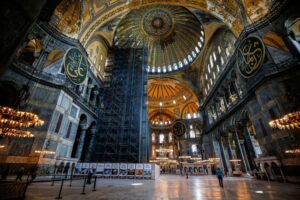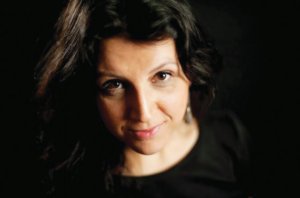Georgi Stardelov (Gevgelija, 28 August 1930) is a philosopher, aesthetician, essayist, literary critic and anthologist. He has been President of the Writers’ Association of Macedonia and President of the Macedonian PEN Centre, President of Philosophers Associations of Macedonia and Yugoslavia, member of European Academy of Sciences and Arts, honorary member of Association of Spanish Artists at the Spanish Royal Academy and visiting professor at numerous European and American universities. This year he was awarded the World Prize of Humanism by the Ohrid Academy of Humanism, a partner organization of Academia Balkanica Europeana. Among the previoulsy awarded personalities are Aleksandr Solzhenitsyn, Peter Brook, Hertha Müller, Romano Prodi, etc. We are publishing part of the speech that Stardelov gave at the ceremony of the award.
I will begin with St. Clement’s thoughts and words. I looked for them in his hagiographies, homilies and sermons and now I want to note the following linguistic postulates: “The secret of the world is locked in the secret of the words”. That is the same with what is said and written in the Holly Bible: “In the beginning was the Word, and the Word was with God, and the Word was God.” Moreover, in ancient Greece, in the beginning of the European philosophy, the word Logos (λόγοζ) was equal with Thought, Sense, Reason and Mind, i.e. with that which unites very deep meanings: from Ancient times to Providence and from Law to Science.
When I saw and got familiar with the names of the previous winners of the World Award of Humanism in today’s world, two things spring to my mind.
First. Ohrid Academy of Humanism and its World Award of Humanism, a unique award in today’s world, is yet another confirmation, among the other things, that the similar world awards elevate, last in people’s memory and are remembered in the history, above all, by the names of the laureates. When we read the names of the previous laureates, we experience the Ohrid Academy in and with its world-historical dimension.
Second. On the other hand, the people who established it, implemented that dimension in its title. They were aware that, after Hiroshima, in our time there is a big, maybe the biggest global crisis in the history of humanity which puts all forms of life on planet Earth, even the human kind, hence the life in general, in jeopardy. Maybe today’s situation is even more frightening. There is no forbidden fruit, no green sprout, that humans have not tried to acquire or violate. It is becoming clear that everything is due to the man and everything is up to the man. That is the reason why we should seek for the solution in the replacement of the stale and hypocritical humanism with the new, really vivifying humanism which will overcome the time and in which the closeness between humans and the nature, and between other humans (although irreversibly lost) can be restored. That new humanism, and the new real eco-anthropology, can provide a vital revival and help the man to exist on Earth together with the nature and with all the other people in an inseparable unity, with a new hope, love and mutual respect. So, it is no coincidence that the first World Award of Humanism was awarded to the Japanese humanist, Buddhist philosopher Daisaku Ikeda. According to him, life today is not possible without such a new hope, without a harmonia prestabilita under the stars, that will decode the dramatical question: why the humans with their brilliant mind for so long have been slaves to the dualistic Manichaeism and the Janus face of science, which, on one hand, brings us salvation from sickness and austerity, while on the other hand brings a complete entropy. It creates magnificent wonders with unrivalled development of sciences: in eugenics and biotechnology, for example, the discovery of human genome enabled cloning of flora and fauna (Dolly the sheep), but the possibility for human cloning will create a Frankenstein-like monster out of a man thus leading to a posthuman society; in atomistic, by creating the new nuclear energy from which and with which the conquering of Cosmos have started, but also poses the possibility that that energy can lead to the total annihilation. Therefore, instead of building a better and more human world with that unprecedented progress in the history of the human kind, we decline and dread from the new barbarism. And that is the central point of the world-wide debate between humanism and transhumanism today.
People who established Ohrid Academy of Humanism, in the time when they established the Academy, the Earth was facing even more tragic implications. After Hiroshima, with radiation, with nuclear waste and with possibility for potential nuclear catastrophe, unfortunately, the situation is not radically changed. Quite the contrary. Soil is polluted, water is polluted (rivers, seas, oceans), and the air is irreversibly polluted, from the ground to the sky. Climate changes, melting of the permafrost at the poles, temperature increase not only lurk in the shadows, but have been happening for quite some time and we feel on our skin the devastating winds, raging storms, hurricanes, floods, fires that bring misfortune and suffering to the people. We are all immersed in death, as phycologist Robert Lifton said. In such a tragical environment for the humanity and the planet, Ohrid Academy of Humanism used the term humanism in the name of the institution, as a reference point, deeply convinced that only a new invigorating and recognized humanism as personal, individual, predestined issue for each and every human, can be a path to salvation. As Hölderlin said “But where the danger is, also grows the saving power.”
Renowned European philosophers, Eugen Fink and Edgar Morin, the former in his The Basic Phenomena of Human Existence, and the latter in Man and Death, posed the question about how to leave the XX century, i.e. how to abandon this possible human self-destruction that jeopardizes and devastates our environment. Both of them, especially Fink, think that it is possible only if we create (and when created to be used) a radically new environmental awareness, human awareness, together with an eco-anthropology as the only way for a new self-awareness and self-consciousness. Following the triumph of Cosmo-centrism, these philosophers rightfully blame anthropocentrism in which the man was declared as a centre of everything, with their anthropoid egoism, anthropoid megalomania and anthropoid unsatisfying greed, with their attempt to usurp and enslave everything, brought this tragic eco-crisis. Therefore, without new bioethics and biophilia, and without an implementation of a new fundamental human project, we cannot hope that today’s global crisis, which has pervaded everything, will be surpassed.
I will repeat and stress that everything is due to the man and everything is up to the man today, when the humanity is faced with the critical dilemma of humanistic ethics of Erich Fromm: to have or to be, but also with the dilemma which culture to accept – the culture of recognition or the culture of negation and destruction. If humanism prevails among stars, humanity, in both dilemmas, will follow the second one, constantly striving to be, to discover itself in the Other and the Otherness, aware of the humanistic message of Dr. Martin Luther King, the most prominent humanist of our time, that darkness cannot drive out darkness; only light can do that just like hate cannot drive out hate; only love can do that.
Georgi Stardelov

